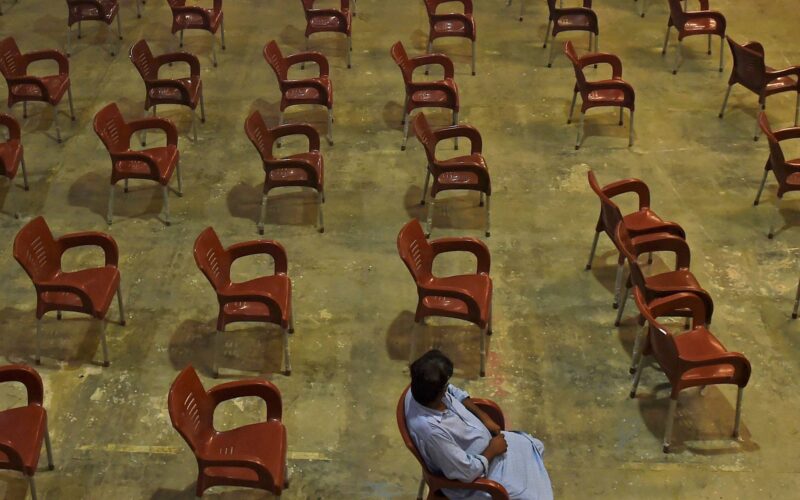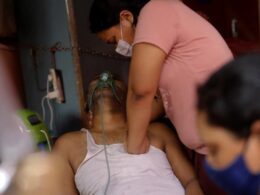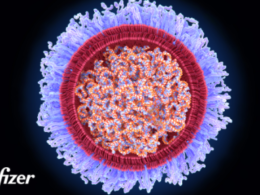Japan Times
May 22, 2021
ROME – The IMF on Friday proposed a $50 billion plan to end the COVID-19 pandemic, aiming to expand global immunization drives, while vaccine firms pledged to supply billions of doses to poorer nations by the end of next year.
The pledges came as Spain said it would open its borders to all vaccinated travelers next month, offering hope Europe’s tourism season will rebound after last year’s battering.
But in Latin America, the coronavirus continued to wreak havoc as the continent’s death toll climbed toward the grim 1 million milestone.
And the World Health Organization (WHO) said the real number of dead from the pandemic could be two to three times higher than official statistics suggest.
In Washington the International Monetary Fund proposed a $50 billion recovery plan with the aim of having at least 60% of the world’s population vaccinated by the end of 2022.
The amount pales in comparison to the massive stimulus rolled out by rich nations, including the latest $1.9 trillion U.S. package.
“One of the key messages of this proposal is that the amount that’s needed is not very big,” said IMF chief economist Gita Gopinath.
In Rome, the Global Health Summit — part of the Group of 20 talks — saw the leading COVID-19 vaccine makers Pfizer, Moderna and Johnson & Johnson promise 3.5 billion doses at cost or discount to middle and low income countries this year and next.
“It is a very clear ‘no’ to health nationalism,” European Commission chief Ursula von der Leyen told the G20 after the EU pledged 100 million doses and to invest in manufacturing hubs in Africa to reduce reliance on imports.
Germany chipped in later Friday, donating 30 million doses to poorer countries this year.
Vaccines are offering hope that nations can finally emerge from the pandemic that has ravaged the global economy and killed more than 3.4 million people since the end of 2019.
In Europe, the tourism sector looked on track to start a cautious resumption as Spain said it would open its borders to all immunized travelers from June 7.
Prime Minister Pedro Sanchez also said that all British travelers would be welcomed in for holidays — without even needing to prevent a negative COVID-19 test.
In sharp contrast, however, Germany said that Britain would be from Sunday declared a zone of “variants mutation” due to the presence of different strains, meaning travel restrictions including a quarantine for those arriving from the U.K.
Germany on Friday opened beer gardens, terraces and pools in some parts of the country for the first time in months.
It was a welcome change for Berliner Sonja Gellfart, who was already in the outdoor pool at the Sommerbad am Insulaner at 7:30 a.m.
“It’s the feeling of freedom because one can get in here and be outdoors, and without a mask,” she said as swimmers splashed past.
But as European nations looked to the future, the WHO warned that the devastation of COVID-19 may be worse than feared.
In a new global health statistics report, the U.N. agency said far more people died than generally acknowledged.
“Total deaths are at least two to three times higher than officially reported,” Samira Asma, the WHO assistant director-general in charge of data, told reporters.
Latin America alone is set to hit 1 million coronavirus-related fatalities in the coming days as many countries in the region struggle to secure enough vaccines.
Brazil has the continent’s highest death with 450,000, a figure second globally only to the United States.
The Senate last month officially launched a probe into why the virus exploded so horribly in the country.
The investigation has particularly focused on far-right populist President Jair Bolsonaro’s unorthodox decisions concerning the outbreak, including opposing stay-at-home measures and masks.
But despite the dire situation in Latin America, the outlook appeared better in Europe, where stock markets rose Friday on growing evidence of economic recovery as restrictions are gradually lifted.
In Britain, retail sales surged 9.2% in April as nonessential stores reopened. Demand for clothing rocketed almost 70% as consumers splashed out.
There was also good news from a pilot plan to test mass gatherings with only 15 people out of almost 60,000 who attended nine events testing positive for the virus, U.K. health officials said.
And getting vaccinations is the new must-do before a hot date, as dating apps joined the White House on Friday to push COVID-19 shots.
Tinder, Hinge, Match, OkCupid and more apps are adding vaccination status to the usual personal profile details.
Getting the shot may also do more for lovers than keep them healthy, a White House statement said.
In a time of both misinformation and too much information, quality journalism is more crucial than ever.
By subscribing, you can help us get the story right.
Originally published at https://www.japantimes.co.jp on May 22, 2021.
Credit of the image on the top:
A man waits to get a COVID-19 vaccinaiton at an inoculation center in Karachi on May 14. | AFP-JIJI












